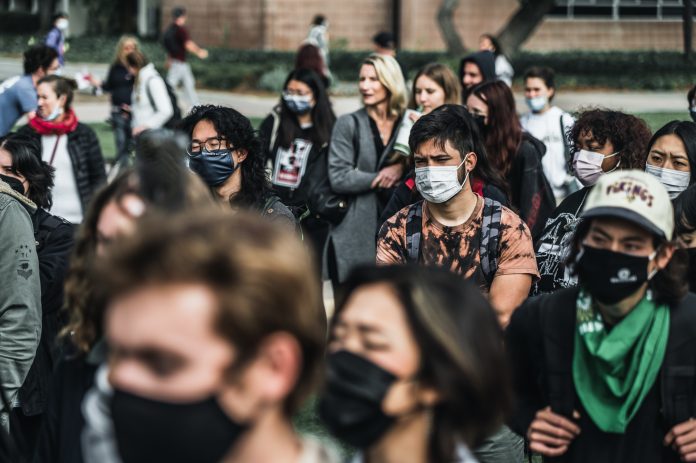Han Do
AS Beat Reporter
On March 16, Chancellor Henry T. Yang announced that, as of April 4, masks are no longer required in UC Santa Barbara (UCSB) classrooms. In an email, he cited the decrease in COVID-19 cases and data from the United States Centers for Disease Control and Prevention (CDC) as reasons for this decision. However, masks remain “strongly recommended.”
The Bottom Line (TBL) sat down with UCSB students to talk about the excitement and concerns about these changes, as well as other implications of the repealed mandate.
With the ending of mask mandates, some students feel excited and hopeful. Trung Bui, a third-year student, feels positive about the change. He said it can feel quite “stuffy” having to wear masks at the gym or at the library for a long period of time.
However, for Bui, the decision of whether or not to wear a mask can depend on social norms as well. If he walked into a classroom and everyone was wearing masks, he explained, then he would feel pressured to wear one as well.
Other students find themselves struggling and feeling left behind with the new mask policy.
Bridget Rios, a fourth-year immunocompromised student, said that she found the mask policy update to be “infuriating” and “frustrating.” She thinks that the administration is prioritizing convenience over the physical health and well-being of some students.
As an immunocompromised person at UCSB, a college well-known for its social and party scene, the mask mandate repeal fueled anxiety for Rios. Even more unsettling are the many stories she heard about people who go to great lengths to prevent catching COVID-19 but still end up contracting the disease.
When asked if she looked for help or utilized any services at UCSB in response to this issue, Rios said that, although her asthma makes her especially at-risk for COVID-19, it’s not an immediate hindrance to daily activities. Thus, she doesn’t feel like she would qualify for help from services like the Disabled Students Program, for example.
“On one hand, I haven’t experienced something that would require me to use my inhaler or go to the ER or anything,” explained Rios. “But, if I were to have caught COVID-19, which affects the lungs, I feel like I would have a really, really difficult time.”
In response to TBL’s inquiries, Campus COVID-19 Clinical Advisor Dr. Mary Ferris shared that the best thing to do as an immunocompromised student is to keep up to date with vaccines and boosters.
Ferris also strongly recommended protecting yourself by wearing surgical or N-95 masks, which are distributed at various locations on campus.
With this mask mandate repeal, Chancellor Yang also announced that the university is working towards “further normalization” of campus life.
This objective is evident in other changes to academic life as well. For example, departments are swiftly moving away from providing any kind of online or hybrid instruction. Many courses now only offer fully in-person instruction, with little to no remote accommodation.
Scott Reid, a communication professor at UCSB, argued that the COVID-19 pandemic has led students to have “unrealistic” expectations when it comes to traditional college instruction.
If you’re sick, he emphasized, then you shouldn’t come to class. But, before COVID-19, if a student happened to miss a lecture, it was common for them to ask for notes from classmates or ask questions during office hours.
“If you missed a quiz, for example, back in the good old days, well, sorry you missed the quiz, but don’t worry, it’s the best 12 of 16 quizzes, you’ll be fine,” said Professor Reid.
Whereas now, Dr. Reid recounted, students much more readily ask, and even expect, to be able to make up a quiz or even do it online.
“It’s a lot of extra work for professors to do this,” explained Dr. Reid. “So, we’re trying to change people’s expectations back to how it was a couple of years ago.”
Regarding the new mask policy, Dr. Reid said he was “favorable” towards the change as it allowed him to see people’s reactions more clearly and feel more connected to his students.
“I didn’t realize how much I miss faces,” Dr. Reid said, “it’s really nice seeing people’s faces again.”
He added that the classroom environment feels more positive because of this change and that many of his students seem more engaged and happy as well.
“When you’re wearing a mask, I guess, subconsciously in the back of your mind, you’ve still got this kind of pathogen prime going on,” Dr. Reid explained, “You may not be consciously aware, but your brain is like ‘there’s disease present, there’s disease present.’ That’s distracting [to the learning environment].”
However, for immunocompromised students like Rios, there’s still some level of uncertainty and fear. And, yet, many believe that these changes are just out of students’ control.
Rios mentioned that she was “triple-vaxxed” and still continued to wear a mask to class. She added that what makes her feel more secure and reassured is knowing she will graduate in a couple of weeks.
“I feel like as long as I can make it through these next seven-ish weeks, then I’ll be fine,” said Rios.











